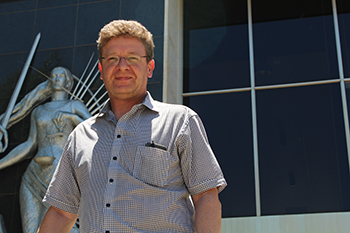Latest News Archive
Please select Category, Year, and then Month to display items
12 October 2020
|
Story Dr Cindé Greyling
|
Photo Supplied
 Exercise and nutrition can work wonders for your mental health – you don’t even have to ‘feel like’ or ‘enjoy’ moving around and eating well for it to work – it does its thing anyway.
Exercise and nutrition can work wonders for your mental health – you don’t even have to ‘feel like’ or ‘enjoy’ moving around and eating well for it to work – it does its thing anyway.
Nowadays, people talk about mental health like it is the common cold – which is good! But do you know what it really means? Being mentally healthy does not only refer to the absence of a mental illness but includes your emotional and social well-being. One would almost want to add physical well-being too, since a healthy body does indeed support a healthy mind. However, since so many people consider themselves ‘mental health experts’, some myths have been sold as truths.
Myth #1 – You are doomed.
Nope. Never. You are never doomed. There is always help. Mental-health therapies range from self-help, talk therapy, medication, to hospitalisation in some cases. Somewhere on this spectrum of treatments, there will be something that works for you. But you must be willing to get the help and do the work. For starters, exercise and nutrition can work wonders – you do not even have to ‘feel like’ or ‘enjoy’ moving around and eating well for it to work – it does its thing anyway.
Myth #2 – It won’t affect you.
It may. Research suggests that one in five people may suffer from a mental illness at some point in their lives. Being well now does not mean that it will stay that way. Biological and environmental factors both impact your mental health. Hopefully not, but at some point, you may experience an event that affects your mental health.
To remain integrated in a community is always beneficial
for anyone suffering from a mental or physical condition.
Myth #3 – Someone struggling with mental health must be left alone.
Hardly! To remain integrated in a community is always beneficial for anyone suffering from a mental or physical condition. You do not need to fix them, but to remain a friend. Continue to invite them, even if they decline. Do not judge, and do not try to understand. Just stay around.
Go and be kind to yourself, and to those around you.
Freedom of religion, a constitutional right and area of global concern
2017-01-17

Prof Shaun de Freitas
Photo: Mamosa Makaya
Freedom of religion is enshrined in the South African Constitution, states that everyone has the right to freedom of religion, which more specifically entails the freedom of conscience, religion, thought, belief and opinion. It makes provision for the protection of religious communities in South Africa. Consequently, the maintenance and protection of such a right is of fundamental importance.
Prof Shaun de Freitas, Associate Professor of Law at the University of the Free State (UFS) specialises in constitutional law, with a specific focus on the right to freedom of religion, and has produced several publications in the field. The latest is titled “Transcending the Private-Public School Divide in the Context of the Right to Freedom of Religion in South Africa”, Chapter 19, in Religious Freedom and Religious Pluralism in Africa – Prospects and Limitations published by Stellenbosch University in 2016.
Prejudice a challenge in all societies
There are numerous challenges faced by religious groups around the world concerning prejudice, association with terrorism and political power and influence. Therefore, research in this field becomes important in helping to uphold the rights and freedoms of religious minority groups, to be able to foster understanding between communities.
Balancing responsibility and religious rights
His current focus is on challenges that have arisen in South Africa, more specifically pertaining to the right of medical practitioners to object conscientiously towards participating in certain medical procedures, the parameters of freedom related to religious associations and the inclusion of religious expression in public schools. These matters are also relevant to many other parts of the world (including, ironically enough, those democratic societies that endeavour to make diversity flourish).